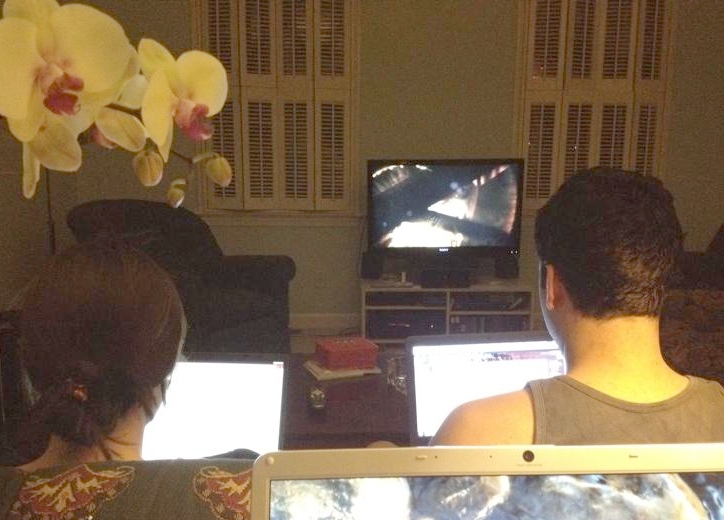 My last blog post was titled Smart TV Will Change Your Living Room — But How? This post shows another angle.
My last blog post was titled Smart TV Will Change Your Living Room — But How? This post shows another angle.
The accompanying image shows three laptop computers in use as we watched Game of Thrones last night.
What’s wrong with this picture?
Nothing, actually, other than the fact that the two young folks on the couch in front of me seemed to be spending more time with their Facebook accounts and work related messaging than watching Tyrion Lannister’s latest antics.
I’m sitting at the third computer in the foreground listening to music while doing some work related research concerning collaborative project management. I’d already seen parts of the episode. (I did receive an instant message via Google from the young man at the right while I was taking this picture with my iPhone; more on that below.)
Let’s assume the the TV is a “smart TV” with a live Internet connection, as is posited in my Smart TV Will Change Your Living Room — But How? blog post. Would this scene have been any different?
I’m not sure. The Game of Thrones episode was coming off the Blu-Ray player, which is connected to the Internet, but an Internet sourced-program is not what we were watching here. Had we been watching a web-sourced signal, and had we been using the 60” plasma TV I’ve been threatening to buy, would we all have been using the TV instead of the laptops you see in the picture to watch the TV show while doing our own web based things?
I don’t think so. Even if the screen were large enough to provide multiple windows with one window showing Game of Thrones and the other(s) showing our personal sessions, I’m not sure that the individual computers sessions would be on the big screen since they were being conducted independently with different groups.
As suggested in my previous post there is the privacy issue to consider. The work being done on these three laptops, even if it was not highly “private” or “confidential,” probably would not be of interest to all the other folks in the room. The family and social interactions being managed by the two young folks in front of me, while overlapping somewhat, are different enough to justify separate sessions. Plus, as I noted above, I received an instant message containing a web link from the young man sitting in front of me. Since it was a message intended only for me, he may or may not have wanted to share that with the other person in the room.
One use of smart TV’s suggested by some pundits is the ease with which social engagement can occur among people who share a common interest. I’ve heard the guys on Frame Rate mention this a couple of times, the idea being that people watching a TV show could be running shared messaging, Twitter, or “Hangout” type video streams in addition to the TV episode being watched. That way it would be possible to share and comment on important topics in real time with a community that has a very high probablility of sharing an interest in, say, finely stitched leather costumes, comets, wolves, or smirking young kings. (This kind of thing happens all the time via Twitter and hashtags but I guess I’m really too old fashioned to be interested since, old fart that I am, I still prefer applying my attention to one thing at a time.)
But in the case of a situation like the one pictured above from my living room, where there are three people in the room, each interacting with different groups with participation via different social and professional networks while following what’s going on via the “big screen,” the idea that this would all be happening via a shared large screen seems unrealistic to me.
What do you think?
Copyright (c) 2012 by Dennis D. McDonald


